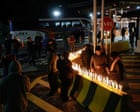
In recent days, the world has witnessed a series of significant events spanning from efforts to rescue trapped miners in Chile, to large-scale protests in Australia, and new legal filings in the United States. Each of these unfolding stories encapsulates the diverse challenges and responses evident in today’s global landscape.
Tragedy struck in Chile at the El Teniente copper mine, the largest underground copper mine globally, situated about 100 kilometers south of Santiago. A seismic event led to a partial collapse—a stark reminder of the powerful forces of nature that can unexpectedly disrupt human activity. Amid a robust rescue operation involving at least 100 people, the body of one miner was found, as determined rescuers continue to search for the remaining trapped miners. The commitment and perseverance demonstrated by the rescue teams, working tirelessly to reach potential survivors, underscores the resilience and solidarity often found in the face of adversity.
Meanwhile, in Australia, contrasting scenes of protest unfolded between Melbourne and Sydney. In Melbourne, protesters advocating for Palestinian rights faced a blockade near the King Street Bridge, which was perceived by some participants as an intimidating display of force by the Victoria police. This stood in marked contrast to the scene in Sydney, where thousands freely marched across the Sydney Harbour Bridge in a similar demonstration. The differing approaches by law enforcement in these cities have sparked discussion and calls for clarity on protest management and civil liberties.
In Queensland, Australia, once again under scrutiny is the state’s forensic services laboratory following revelations of repeated errors in DNA testing—an issue that has unfortunately affected the progression of numerous criminal cases, including those involving severe crimes such as rapes and murders. This failure has prompted a comprehensive review, highlighting an urgent need for reform within the laboratory processes to uphold justice and provide timely resolutions, especially for the victims awaiting justice and closure.
Across the Pacific, in the United States, developments within the judicial and political arenas are drawing attention. The administration under former President Donald Trump is involved in legal proceedings addressing allegations of established daily quotas for immigration arrests. Despite earlier reports indicating goals set for Immigration and Customs Enforcement (ICE) agents, the administration has formally denied enforcing such quotas. This ongoing legal matter reflects the complex interplay of policy, enforcement, and civil rights that defines discussions about immigration in the U.S.
Tragically, Montana grapples with the aftermath of a shooting incident in the small town of Anaconda, where four local residents lost their lives. As authorities continue their search for the suspect, the community is enveloped in mourning, highlighting once more the pressing concerns surrounding gun violence and public safety.
While these events are distinct in nature, each one offers a glimpse into ongoing global issues that resonate with interconnected themes of human courage, resilience, and the pursuit of justice. Whether through the heroic efforts of miners and rescue teams in Chile, the peaceful expression of democratic rights in Australia, or the quest for justice and policy-making in the U.S., these stories remind us of the shades of human experience and the vital role of collective efforts in addressing the complexities of our time.
Source: {link}
